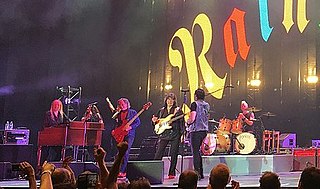
Rainbow are a British rock band, formed in London and Los Angeles in 1975 by guitarist Ritchie Blackmore. Established in the aftermath of Blackmore's first departure from Deep Purple, they originally featured four members of the band Elf, including their singer Ronnie James Dio, but after their self-titled debut album, Blackmore fired these members, except Dio, recruiting drummer Cozy Powell, bassist Jimmy Bain and keyboardist Tony Carey. This line-up recorded the band's second album Rising (1976), while Long Live Rock 'n' Roll (1978) saw Bob Daisley and David Stone replace Bain and Carey, respectively. This was the last album with Dio before he left the band to join Black Sabbath in 1979.
Heaven and Hell may refer to:

Black Ivory is an American R&B group from Harlem, which had a number of hits in the 1970s, including "Don't Turn Around", "You and I", "Time Is Love", and "Will We Ever Come Together".
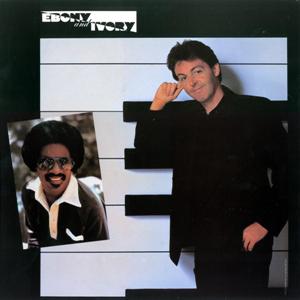
"Ebony and Ivory" is a song that was released in 1982 as a single by Paul McCartney featuring Stevie Wonder. It was issued on 29 March that year as the lead single from McCartney's third solo album, Tug of War (1982). Written by McCartney, the song aligns the black and white keys of a piano keyboard with the theme of racial harmony. The single reached number one on both the UK and the US charts and was among the top-selling singles of 1982 in the US. During the apartheid era, the South African Broadcasting Corporation banned the song after Wonder dedicated his 1984 Academy Award for Best Original Song to Nelson Mandela.
"Don't Turn Around" is a popular song written by Albert Hammond and Diane Warren. It was originally recorded by American singer Tina Turner and released as the B-side to her 1986 hit single "Typical Male". It has since been included on Turner's compilation album The Collected Recordings: Sixties to Nineties (1994), as well as featuring in the Tina musical since 2018.

Leroy O'Neil Jackson Jr., known by his stage name Leroy Burgess, is an American singer, songwriter, keyboard player, recording artist, arranger and record producer.
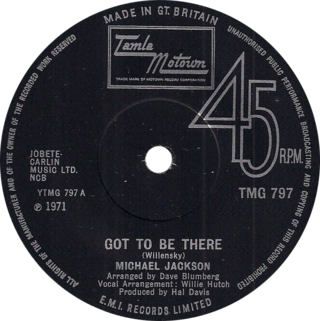
"Got to Be There" is the debut solo single by the American recording artist Michael Jackson, written by Elliot Willensky and released as a single on October 7, 1971, on Motown Records. The song was produced by Hal Davis and recorded at Motown's Hitsville West studios in Hollywood.
"Choo Choo Ch'Boogie" is a popular song written by Vaughn Horton, Denver Darling, and Milt Gabler.

American Idol: Greatest Hits was released on iTunes on June 12, 2007. The album was finally released almost a month after the May finale. The album contains 11 cover songs, by the finalists and Jordin Sparks' winning single. The Collector's Edition contains 76 songs and includes cover songs by top 12 and, again, Jordin Sparks' winning single. Neither collection of songs was released as an actual CD but both are available exclusively through the iTunes Store.

My Kind of Blues is the seventh studio album by American singer-songwriter Sam Cooke. Record producer by Hugo & Luigi, the album was released in October 1961 in the United States by RCA Victor.

Revep is the third collaboration record between Japanese composer Ryuichi Sakamoto and German electronic artist Carsten Nicolai. This EP continues the series titled the Virus Series. The EP was released on 23 May 2006 via Raster-Noton label.
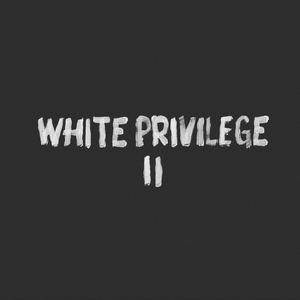
"White Privilege II" is a song by American hip hop duo Macklemore & Ryan Lewis from their second album This Unruly Mess I've Made (2016). The song, a sequel to Macklemore's solo song "White Privilege" from his first album The Language of My World (2005), discusses white privilege and the social movement associated with Black Lives Matter. According to the duo, "this song is the outcome of an ongoing dialogue with musicians, activists, and teachers within our community in Seattle and beyond. Their work and engagement was essential to the creative process." The song's lyrics span around nine minutes and 1,300 words. One of the project's collaborators is Chicago singer Jamila Woods, whose voice is featured on the track. "White Privilege II" was released as promotional single on January 22, 2016.

Stuart D. Bascombe is an American singer, songwriter, musician, and record producer. Bascombe is an original member of the R&B/soul vocal group Black Ivory who recorded a number of R&B hits in the 1970s, including "Don't Turn Around", "You and I", "Time Is Love", "I'll Find a Way ", and their disco hit "Mainline".
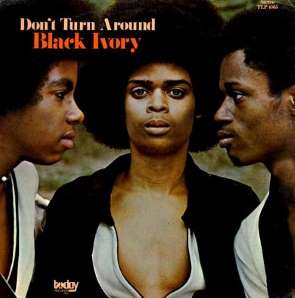
Don't Turn Around is the debut album by American soul/R&B vocal group, Black Ivory. The album was produced and arranged by record producer, Patrick Adams. and released in March 1972 on Today Records/Perception Records

Baby Won't You Change Your Mind is the second album by American soul/R&B vocal group, Black Ivory. The album was produced by Patrick Adams and David Jordan, and released in December 1972 on Today Records/Perception Records.

"Don't Turn Around" is the debut single by the American soul/R&B vocal group Black Ivory. The song was written, produced, and arranged by record producer Patrick Adams

"You and I" is a top 40 single by American soul/R&B vocal group, Black Ivory. The song was written by group members Leroy Burgess and Stuart Bascombe and produced and arranged by record producer, Patrick Adams

"I'll Find Away (Loneliest Man in Town)" is a hit single by American soul/R&B vocal group, Black Ivory. The song was written by group member Leroy Burgess and musician Patrick Adams.

Feel It is the third album by American soul/R&B vocal group, Black Ivory. The album was produced by Robert John, Mike Gately and Black Ivory and released in June 1975 on Buddah Records.

Russell Patterson is an American singer, songwriter, recording artist, record producer, and actor. Patterson is an original member of the 1970s R&B Group, Black Ivory who recorded a number of R&B hits including, "Don't Turn Around", "You and I", "I'll Find A Way ", "Time Is Love", and "Mainline".














